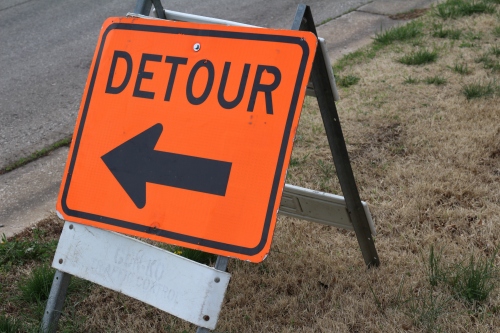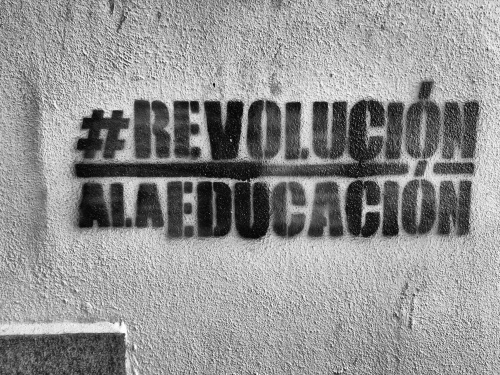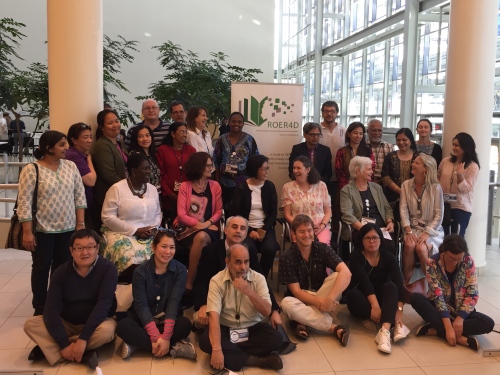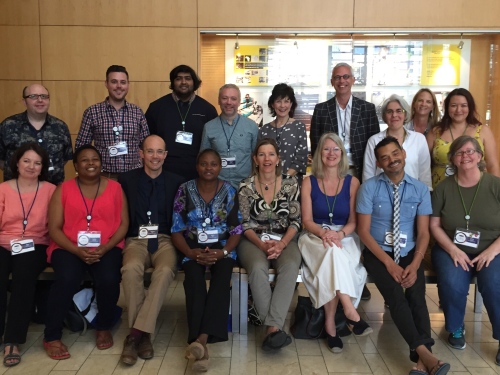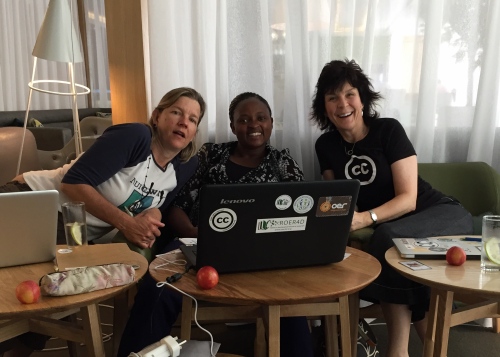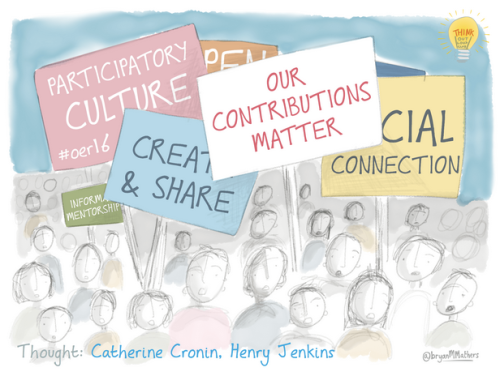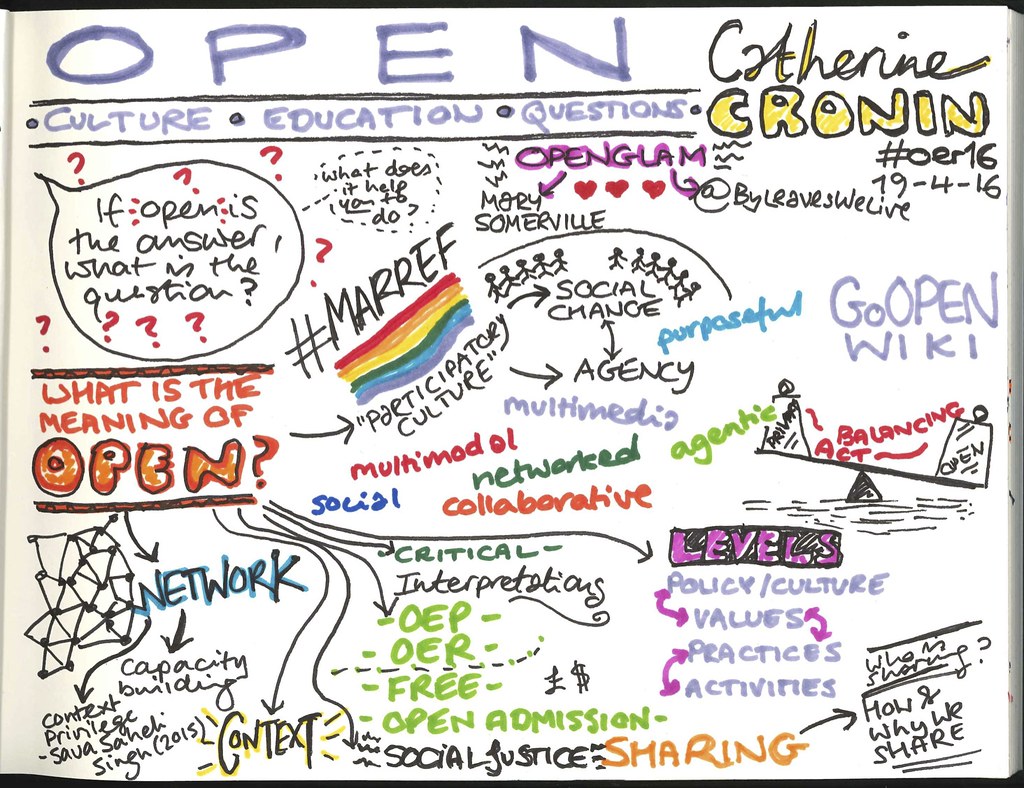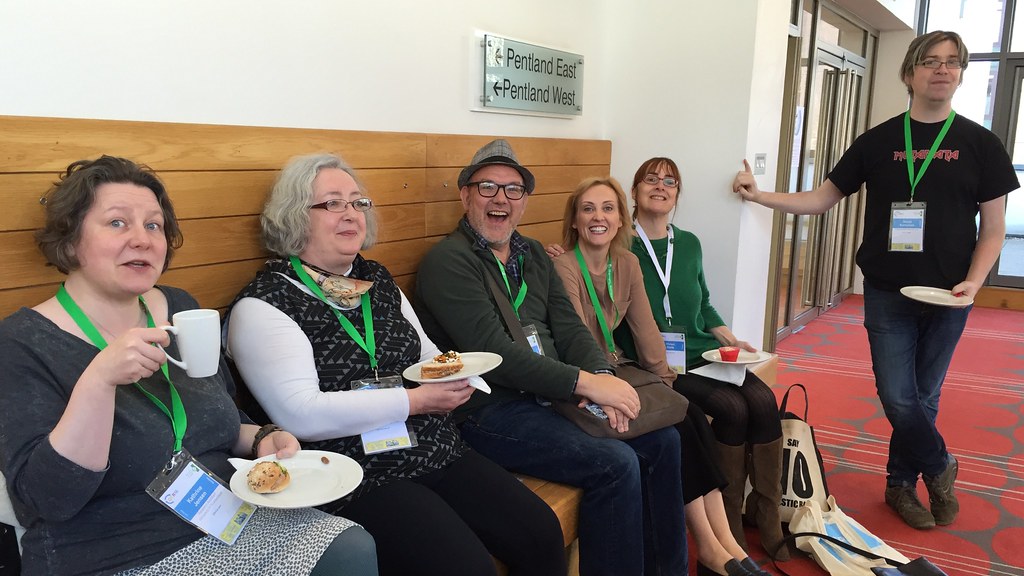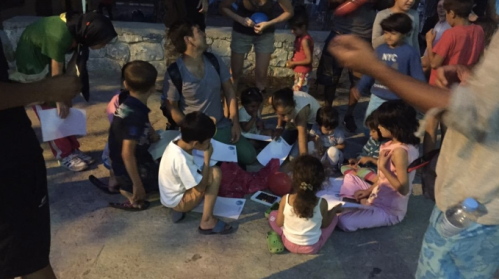
CC BY 2.0 woodlewonderworks (Flickr)
The working title of my PhD research study is Exploring open educational practices in higher education. I’m currently at a ‘pausing point’ between phases – so I plan to write a few blog posts to capture my findings and thinking so far and where I’m heading next. This is the first of those posts.
The starting point
I began the PhD journey wanting to find out more about what happens when students and educators meet, interact and learn together in open online spaces, beyond the confines of the classroom and the VLE. As defined by danah boyd, networked publics are simultaneously “spaces and the imagined collectives that emerge as a result of the intersection of people, technology, and practice”. So what happens when those collectives are comprised of educators, students and others – blogging and using social media tools (e.g. Twitter, Hypothesis, etc.), adapting, creating and sharing OER, learning together, and sharing their learning? As an open educator for some time I had joined my students in such activities and could easily describe my own motives and experiences, and share student work and reflections. But I wanted to learn more. What motivates educators to engage in learning and teaching in open online spaces? Why and how do students respond to and engage with staff (or not) in open online spaces? How do students and staff construct and enact their digital identities in networked publics? What learning happens in those spaces and imagined collectives? What else happens? How can institutions support staff and students engaging in open educational practices? And how are learning, and institutions of learning, being re-imagined as a result?
Translating this to a coherent PhD study took some time. 😉 I divided the research study into two phases. I’m close to finishing the first phase and preparing for the second. In Phase 1 I’m exploring academic staff meaning-making and decision-making regarding why, where, and how they interact with students online; their use of open educational practices; and the construction and negotiation of their professional and digital identities. It has been a privilege to explore these ideas with academic staff, and to develop a greater understanding of the complexities of these processes. In Phase 2 I will explore student perspectives also, i.e. whether, why, and how students engage with academic staff and others in open online spaces, and the construction and negotiation of their digital identities across online spaces and contexts.
The terms ‘openness’ and ‘open education’ describe a wide range of beliefs, practices and initiatives ranging from open admission policies to open educational resources (OER) and open educational practices (OEP). The broadest interpretation of open education is OEP. Education researchers across many domains have described and theorised all or some of the practices characterised as open educational practices using a variety of definitions and theoretical frameworks. These include open scholarship (Veletsianos & Kimmons, 2012a; Weller, 2011), networked participatory scholarship (Veletsianos & Kimmons, 2012b), connected learning (Kumpulainen & Sefton-Green, 2012) and networked learning (Dirckinck-Holmfeld, et al, 2012). All are emergent scholarly practices that espouse combinations of networked participation, sharing and openness. For this research study, I’m using a broad definition of OEP which includes the creation, use and reuse of OER, open access publishing, the use of open technologies, open learning, and open/public pedagogies in teaching practice, with the goal of enabling learners and teachers to share the processes of knowledge creation (Beetham, et al, 2012; Ehlers, 2011).
Following are the main ‘raw’ findings from Phase 1, prior to further analysis and comparison with the literature.
Phase 1: methodology
The empirical setting for the study was one higher education institution (without policies regarding open education). Participants were members of academic staff, defined most broadly as those employed by the university whose responsibilities include teaching – regardless of their terms of employment, i.e. permanent, temporary or no contract; full-time or part-time. I felt it was essential that the voices of permanent as well as precariously-employed staff were included in the study. A constructivist grounded theory approach (Charmaz, 2014) was used for sampling, interviewing and analysis. Semi-structured interviews were conducted with 19 members of academic staff. All 19 participants teach undergraduate students; some also teach postgraduate and adult learning students. None of the participants taught fully online courses; all teaching was face-to-face or blended learning.
Phase 1: interim findings
Among the 19 participants, fewer academic staff used OEP for teaching than for either learning or research. There were three identifiable categories of ‘using OEP for teaching’. In order of decreasing prevalence these were:
- Choosing to be visible and share resources with students in open online spaces – These academics have open digital identities (e.g. Twitter, blog) and share these with students as a way of exchanging information and/or engaging in conversation. This was often, but not always, accompanied by the use of a module hashtag(s) to curate module-related resources and conversations.
- Creating learning activities in open online spaces – These academics created open learning activities for students, e.g. inviting or requiring students to use a Twitter account, engaging in live Twitter chats during class, blogging and/or creating courses in open online spaces (e.g. WordPress blog with Creative Commons license).
- Encouraging students to share their work openly – These academics encouraged students to share their digital media projects, e.g. in a public Facebook group.
Participants who used OEP for teaching described various pedagogical advantages of their open practice. These included students feeling more connected to one another and to their lecturer, students making connections between the course theory/content and what’s happening in the field right now, students sharing their work openly with authentic audiences, and students becoming part of their future professional communities. Many participants also expressed caution regarding the use of OEP for teaching. These included staff who did not use open practices, as well as those who did but who engaged in the practice while reflecting on both its risks and benefits. Participants who expressed caution discussed both pedagogical and practical concerns, e.g. lack of certainty about the pedagogical value of open practices, concern about students’ possible over-use of social media, worries about their own additional workload, concerns about excessive noise in already busy social media streams, and concerns about context collapse, both for themselves and for their students.
Using the constant comparative method of analysis, four interrelated processes were identified as being associated with using OEP for teaching: valuing social learning, balancing privacy and openness, growth mindset re: digital literacies, and challenging role expectations. All four processes were evident for each of the participants who used OEP for teaching. In addition to these, environmental factors operated as enhancers or inhibitors, strengthening or reducing the likelihood that academic staff may use OEP for teaching. Below is a short summary of each of these processes.
Valuing social learning
Many academic staff value social learning. Some participants explicitly identified their teaching philosophy as social constructivist, while others described moving away from lecturing, efforts to encourage more student discussion and engagement, the importance of creating a learning community, and engaging in co-construction of knowledge along with their students. Not all of these participants used OEP in their teaching; many created social learning activities in their classrooms and some also tried to do this within the VLE. While it was clear that all educators in this study who use OEP for teaching valued social learning, the reverse was not necessarily true.
Balancing privacy and openness
Striving for a balance between privacy and openness is a key factor contributing to the use of OEP for teaching. None of the participants said that they did not value privacy. However, those who engaged in OEP for teaching managed to strike a balance between protecting their privacy, to the level that they wished, and seeking to gain the benefits of openness for themselves and their students. Regarding privacy, most participants stated that they make a clear distinction between what is personal and what is professional and also that it is important to maintain a clear staff-student boundary. The definition and management of those boundaries varied widely, however.
Many participants reflected on their personal and professional identities/activities online, with some participants happy to blend the two and others wanting a clear distinction. Some participants, for example, worried about context collapse, i.e. mixing streams of conversations about work, family life, social activities, sports, politics, etc. For those participants who want to distinguish between their personal and professional online activities, the most challenging boundary to manage is often with their immediate colleagues. This was most often expressed as the dilemma: will I accept this friend request from my colleague/work acquaintance on Facebook? Across all participants, there was recognition that personal-professional boundary keeping is an individual decision. Participants who wished to maintain this boundary described various ways of managing it, e.g. use of privacy settings, maintaining different Facebook presences for professional and personal activities, using different tools for different purposes (typically Facebook for private/personal, Twitter for public/professional), or non-use of social media altogether.
Likewise, while many participants spoke of the importance of supporting students, most described the importance of keeping a staff-student divide, both online and offline. This was expressed most often as keeping a professional distance: “I don’t like being too palsy with undergraduates”; “it crosses the line of creating a non-professional relationship”. Participants offered different reasons for not wanting to interact with students outside the bounds of email or the VLE. Online boundary keeping was described either in terms of controlling what students might see (e.g. personal comments, family photos) or controlling what staff themselves might see (e.g. student comments). Again, across all participants, there was recognition that connecting with students on social media is an individual decision: “I have personal rules for that”; “there’s no hard and fast rules”. There was an overwhelming tendency by participants not to connect with students in private online spaces, but in open online spaces only – if at all. This was evident in the number of participants who said they do not friend students in Facebook, although some staff have created Facebook pages/groups (or professional Facebook profiles) to work around this. Twitter, seen as open and public, was considered more acceptable by some as a tool for staff-student interaction. Managing this staff-student boundary, as with the personal-professional boundary, was considered by many participants to be a constant challenge: “you’re negotiating all the time”.
Growth mindset re: digital literacies
Academic staff who value social learning and who balance privacy and openness might be predisposed to using open educational practices for teaching. However, another necessary factor is having digital literacies, or perhaps more specifically, having a growth mindset re: digital literacies. [I am not completely happy with this description at present, but it is a placeholder for now.] Having a growth mindset re: digital literacies includes being aware of a range of digital and open tools; understanding how to use various tools, both technically and pedagogically; keeping abreast of changes in the landscape of digital and open tools; and most importantly, feeling confident about learning and experimenting with new tools and new features. For the participants in this study, this expertise and confidence was often described in connection with peer support and/or professional development, either within or outside the institution (see Enhancers/ Inhibitors below). Having a growth mindset re: digital literacies relates to the previous process: balancing privacy and openness. Staff with highly-developed digital literacies are more likely to have the confidence and skills required to manage privacy settings, negotiate various social media tools, and operate with agency in complex social media ecosystems.
Not all participants with a growth mindset re: digital literacies used OEP for teaching. Some who are proficient users of social media teach their students about social media and digital literacies, yet choose not to connect with students in open online spaces. As one participant described: “I don’t mind if students follow me and if they find stuff that I’ve written online. But I just don’t encourage it as part of the teaching, or their relationship with me as their teacher.” Several participants did not have a growth mindset re: digital literacies – some said they lacked the time or inclination to keep abreast of the rapidly changing landscape of social media and open tools, others used a ‘digital natives’ discourse (Prensky, 2001). The digital natives discourse, i.e. believing that younger rather than older people tend to be experts in using social and digital media, has been discredited (Lanclos, 2016; White & Le Cornu, 2011), yet the narrative continues to resonate with many, including some educators and students. [Much more to say on this – will include in next blog post.]
Challenging role expectations
All participants who used OEP for teaching described various ways that they challenged expectations of them in their role as lecturers. Many challenged their role as ‘the expert’ — or the sole expert, at least. These participants spoke of being learners as well as teachers and of seeking to create and be part of a community of learners.
“So instead of really only knowing you for 45 minutes twice a week for 12 weeks… at least they think, ‘oh, maybe she actually cares’, or ‘oh, I could actually ask a question if I needed to’. Whereas email, it takes a lot of nerve for a first year to write an email and send it to what they call a professor. They just feel inhibited no matter how nice you are. I think it maybe allows them to feel like you’re more approachable. And if nothing else, that would be good.”
“I do think in order for me to create the conditions that people can learn in, I have to create a community of people here. I have to make sure people are comfortable interacting with each other; I have to make sure they’re comfortable interacting with me. So that idea of a community of learning would underpin my philosophy of teaching.”
Enhancers/inhibitors to using OEP for teaching
In addition to the processes defined above, participants described various environmental enhancers and inhibitors which served to act as lenses to increase or decrease the likelihood that they might choose to use OEP for teaching. Enhancers included institutional support and/or recognition, professional development opportunities (within or outside the institution) and peer support (e.g. personal learning networks or PLNs). Inhibitors included stress or anxiety experienced by individuals, particularly in connection with their institutional roles (e.g. workload, departmental or institutional culture). [Very much more to be said here, particularly in relation to work by Richard Hall on ‘The university as anxiety machine’]
…
While this first phase of the research study has been focused on academic staff, the next phase of the study will be a smaller study engaging both students and staff to explore why and how they interact in open online spaces and how they enact and negotiate their digital identities in those spaces.
I’ll continue to blog as my thinking develops and analysis proceeds. I hope that this sharing of raw findings and thoughts might spark a few conversations – I’d welcome your feedback.
REFERENCES:
Beetham, H., Falconer, I., McGill, L., & Littlejohn, A. (2012). Open practices: Briefing paper. JISC.
Charmaz, K. (2014). Constructivist Grounded Theory (2nd ed.). London: Sage Publications.
Ehlers, U. (2011). Extending the territory: From Open Educational Resources to Open Educational Practices. Journal of Open, Flexible and Distance Learning, 15(2).
Hall, Richard (2014, March 19). On the University as anxiety machine. Richard Hall’s space. [blog]
Kumpulainen, K. & Sefton-Green, J. (2012). What is connected learning and how to research it? International Journal of Learning and Media, 4(2), 7-18.
Dirckinck-Holmfeld, L., Hodgson, V., & McConnell, D. (Eds.) (2012). Exploring the Theory, Pedagogy and Practice of Networked Learning (pp. 3-24). New York: Springer.
Lanclos, D. (2016). The death of the digital native: 4 provocations from DigiFest speaker Dr. Donna Lanclos. Jisc.
Prensky, M. (2001). Digital natives, digital immigrants. On the Horizon, 9(5).
Reed, P. (2013). Hashtags and retweets: Using Twitter to aid community, communication and casual (informal) learning. Research in Learning Technology, 21.
Rolfe, V. (2012). Open educational resources: Staff attitudes and awareness. Research in Learning Technology, 20.
Veletsianos, G., & Kimmons, R. (2012a). Networked participatory scholarship: Emergent techno-cultural pressures toward open and digital scholarship in online networks. Computers & Education, 58(2), 766–774.
Veletsianos, G. & Kimmons, R. (2012b). Assumptions and challenges of open scholarship. The International Review Of Research In Open And Distance Learning,13(4), 166-189.
Weller, M. (2011). The Digital Scholar: How Technology Is Transforming Scholarly Practice. Basingstoke: Bloomsbury Academic.
White, D.S. & Le Cornu, A. (2011). Visitors and Residents: A new typology for online engagement. First Monday, 16(9).
Image source: CC BY 2.0 woodleywonderworks (Flickr)
